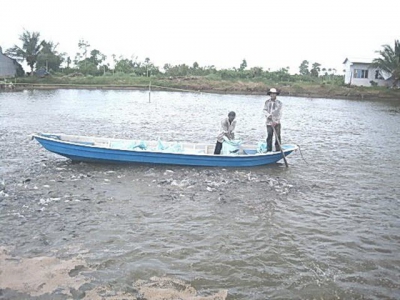FSIS to have final say on Vietnamese tra fish quality compatibility next month

Farmers at a tra fish farm in the Mekong Delta - PHOTO: TRUNG CHANH
CAN THO – The Food Safety and Inspection Service (FSIS) under the U.S. Department of Agriculture in September will decide whether Vietnam’s food safety control system for tra fish is equivalent to that of the United States, which serves a a criteria for Vietnam's continued shipment of the product stateside.
At a conference on the production and consumption of tra fish, held in An Giang Province on August 21, Ngo Hong Phong, deputy head of the National Agro-Forestry-Fisheries Quality Assurance Department (Nafiqad), noted that FSIS will make its final decision on the equivalence assessment in September.
An inspection team from FSIS had earlier completed the fourth step of the inspection in Vietnam as part of the six-step equivalence process, where the exporting country must first submit a written request to FSIS, and then complete the Self-Reporting Tool and accompanying documents.
FSIS then reviews the documents and may request additional information before conducting an inspection in the exporting country. Once this is complete, FSIS initiates a rulemaking process and invites comments. In the last step, FSIS recognizes equivalence with a final ruling.
The inspection team has so far launched an on-site inspection of the food safety control systems of two central surveillance agencies, a testing room under Nafiqad, eight tra fish processing factories and two tra fish farming facilities.
Although the team praised Vietnam’s organization and adoption of food safety controls, FSIS highlighted some shortcomings, such as deficient results of safety inspections, ice water containing surface impurities, inappropriate tasks being assigned to laborers and unsuitable pipe systems on washing machines.
Phong stated that the department had sent to FSIS Document 1165/QLCL-CL1, detailing how it had handled the listed shortcomings in the wake of the inspection.
In a draft of the report, FSIS confirmed that Nafiqad had provided evidence and documentation to prove the enterprises had fixed the highlighted problems.
Nafiqad, on July 24, had held a meeting with FSIS to discuss these shortcomings, Phong said, adding that on August 10, Nafiqad had sent Document 1632/QLCL/CL1 containing Vietnam’s official comments to FSIS.
Phong remarked that Vietnam had provided sufficient documentation and evidence and warned that the United States might make a negative decision resulting in disadvantages for Vietnam’s tra fish sector if Vietnam’s technical cooperation activities and diplomacy programs fail to be taken into account.
The equivalence determination process for Vietnamese tra fish began on March 1, 2016. However, FSIS gave catfish-exporting countries a transitional period of 18 months to prepare the relevant documentation.
Countries that failed to submit the required documentation by September 1, 2017, were barred from shipping catfish to the United States.
Vietnam reportedly submitted the required documentation on August 23, 2017.
Under the roadmap of FSIS, the equivalence process was supposed to begin on September 1, 2017, but FSIS had decided to inspect 100% of the catfish shipment to the United States from August 2, 2017, one month earlier than expected.
The change heavily affected Vietnam’s tra fish exports to the United States. Vietnamese tra fish exports to the country accounted for 21.1% of its total tra fish exports in the first half of 2017, but the figure dropped to 11.7% over the second half of 2017.
FSIS has warned of an excessive amount of chemicals and chemical dyes found in three shipments of frozen tra fish from Vietnam since September 1, 2017.
Có thể bạn quan tâm
 Mekong Delta urged to apply hi-tech in fish farming
Mekong Delta urged to apply hi-tech in fish farming The seminar was held to review the production and consumption of catfish and implementation of the high-quality pangasius breeding project.
 Polychaete worms reduce waste, provide food in aquaculture
Polychaete worms reduce waste, provide food in aquaculture The marine polychaete Nereis diversicolor can be integrated into recirculating aquaculture systems to reduce particulate matter.
 Ben Tre: Shrimp to become spearhead of production industry
Ben Tre: Shrimp to become spearhead of production industry The Mekong Delta province of Ben Tre will be developing its shrimp sector’s value chain with intensive farming and advanced technological application